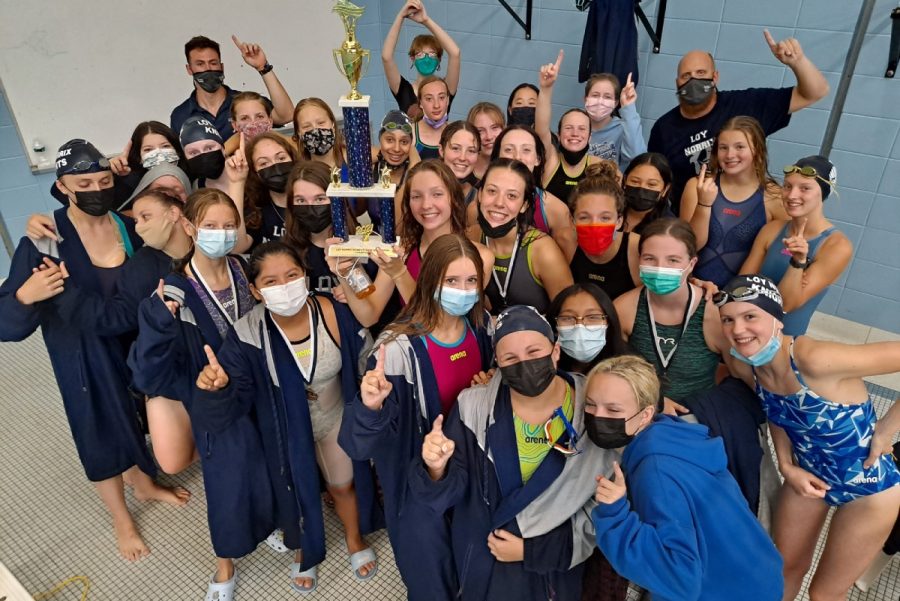Mental health of high school athletes is more important than ever
Credit: LN Lady Knights Swim & Dive
Loy Norrix swimming team holds up the number “1” after winning their meet against PN.
March 10, 2022
 Editor’s note: This story is part of “State of Mind: The Modern Condition of Youth,” produced in partnership with local, independent news outlet NowKalamazoo, which provided editorial support and guidance.
Editor’s note: This story is part of “State of Mind: The Modern Condition of Youth,” produced in partnership with local, independent news outlet NowKalamazoo, which provided editorial support and guidance.
Mental health is a huge aspect of young lives. With the combined pressures of the COVID pandemic, school, working and issues at home, there are a lot of things on high school students’ plates. But some high school students have one more thing to work hard on: athletics.
According to an article by Ohio University titled “Identifying Mental Health Concerns in High School Athletes” National Federation of State High School Associations, about 32% of young people have some kind of anxiety disorder. Some symptoms of anxiety include feeling restless and on-edge, fatigued, trouble concentrating and trouble sleeping.
But anxiety isn’t the only thing that young people suffer from. Depression is also a major issue in people between the ages of 10 and 24. The second most reported cause of death for young people between 10 and 24 is suicide. These are issues that these people in high school and sports especially deal with.
High school athletes are constantly on the move, from school to practice and for some, work. Some athletes believe that they feel more stressed than their peers that don’t play sports.
“I feel as if many people who are involved in more extracurriculars, not just sports, have more stress, partly because they have less time to relax,” said junior Reaghan Barbrick. Barbrick is a member of the Loy Norrix cross country team, lacrosse team and track and field team. Athletes have a lot of stress and anxiety having to deal with school and other things like work.
Having tighter schedules than a regular student is a common issue for athletes, so being able to just relax is rare, but when they get a moment to settle down, it’s the perfect time to take care of their mental health.
“I feel like I get less sleep than I have to, so I feel more tired because I’m working out all day– get home and do homework then go to bed,” said senior swimmer Keng Wee.
There are multiple ways for teens to improve their mental health. Doing things like getting regular exercise, a full night of sleep, connecting with friends, or participating in relaxing activities like yoga can improve a person’s state of mind. Teens also find, playing video games or meditation can help them relax and de-stress.
Some athletes like senior Victoria McGowan motivate themselves to boost their mental health.
“I get in the gym outside of basketball and tell myself everyday ‘I can do this,’” McGowan said.
Other athletes like to spend time away from their respective sports to take care of themselves.
“I listen to music and mental training podcasts and just take a lot of deep breaths when needed,” said senior baseball player Gavin Gardner.
Of course when it comes to sports, you have to be in shape. Staying in shape helps boost your mental health. It’s like body and mind working together.
“They go together. It’s like communication and comprehension. Your brain tells you what to do for your mental health, and your body makes your brain feel good for physical health,” said junior football manager and bowler Alyssa Capps.
But sports can sometimes be the downfall to an athlete’s mental health, from pushing themselves too much or being pushed too hard by coaches. Sports aren’t always a stress reliever and sometimes give athletes more anxiety.
“I was so busy worrying about pleasing my coaches, and I was starting to play for their sake. It tore me up so much,” McGowan continued. “I was so scared of not being good enough or not playing the way they wanted me to play, I had to learn to play for myself. It’s the sport that I fell in love with, and I didn’t want to let anyone take the love away from me. So now I play for me and nobody else.”
Coaches are aware that they can add to athletes stress, even though it is not intentional. A coaches job is teach and help their players, but they know their athletes have extra weight on their shoulders
“Coaches want to draw the very best out of their players and that itself is the stressor that can make or break an athlete’s performance. Parents, fans and the student body all place more expectations on the athletes to not only perform well but to win,” said assistant football coach Sean Bergan.
Even coaches know that an athlete’s mental health is very important. Coaches know they need to be aware of their athletes’ mental health and should have a plan to talk to their athletes.
“I have different actions that I have used in the past, but the one that I feel is most beneficial is improving self-understanding by just talking through things with them,” said head baseball coach Zach Rickli. “This is used to improve self-awareness around their emotions, goals and mental capacity, and then you just continue to build on it once the foundation is there.”
High school athletes are busy, and it’s important to take care of their mental health. Athletes aren’t super-humans, they have their own troubles and different ways to solve them. Everyone needs to take time to just breathe and take care of themselves even if their schedule is as hectic as an athlete’s.













